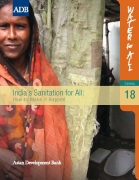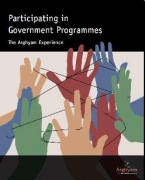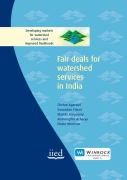Government Programmes
National Water Mission under National Action Plan on Climate Change: Revised Comprehensive Mission Documents - Ministry of Water Resources (2009)
Posted on 05 Jun, 2010 11:46 PMThe National Water Mission (NWM), under the aegis of the Ministry of Water Resources, is one of the eight missions being constituted under the National Action Plan for Climate Change (NAPCC). The NAPCC was launched by the Prime Minister in 2009 as a nation-wide effort to tackle climate change.
Urban Development Policy 2009 - Department of Urban Development (Government of Karnataka)
Posted on 05 Jun, 2010 04:20 PMThe Urban Development Policy, Karnataka has been developed, by the Department of Urban Development (Government of Karnataka), as a response to the challenges that are being faced by the state due to rapid urbanisation leading to:
- An increase in population in urban areas due to migration
- Increase in the number of poor residents in urban areas
- Infrastructural shortfall on several fronts
- Shortage of resources
- The challenge of ensuring the basic welfare of the poor in urban areas
- The increasing need for strengthening governance, planning and administration
IEC in Jalswarajya Project (Maharashtra) - A guiding light for water supply sector
Posted on 01 Jun, 2010 11:51 PMIEC in Jalswarjya- A guiding light for WSSD, Govt. of Maharashtra
- An article based on vibrant experience of Jalswarajya Project
Prabhakar S. Mishra
IEC specialist, Nagpur
Introduction
Whenever we are working on development front we need to put communication at heart place. Worldwide past experience suggest that modernization approach of development communication fail to sustain impact on stakeholders due to its vertical one way format based on prejudice which fix responsibility of being backward on under develop class. Till end of 20th century mostly communication in development sector was argument and advocacy based. Also efforts initiated with expectation of switch effect behavioral change, that outcast trust from communication.
India's Sanitation for All: How to make it happen - An ADB report
Posted on 26 May, 2010 11:02 AM This discussion paper by ADB, examines the current state of sanitation in India in the context of the Millennium Developmental Goals, which call for a 50% reduction in the proportion of people without sanitation by 2015 and India's goal of providing Sanitation for All by the 2012.
This discussion paper by ADB, examines the current state of sanitation in India in the context of the Millennium Developmental Goals, which call for a 50% reduction in the proportion of people without sanitation by 2015 and India's goal of providing Sanitation for All by the 2012.
The paper targets policy makers, governmental ministries, state and local governments, non-governmental organisations, developmental agencies and all those who are involved in the planning and implementation of sanitation policies in India. It makes a few recommendations for the successful implementation of sanitation efforts in India.The focus of these recommendations is on household sanitation, which includes safe disposal of human excreta, as measured by household ownership of a sanitary latrine and household access to drainage facilities.
Rank of Indian cities on sanitation (2009-10) - National Rating and Award Scheme for Sanitation in Indian Cities (MoUD)
Posted on 24 May, 2010 02:18 PMIn order to get a sense of the current status of sanitation in India's cities, a survey was initiated by the Ministry of Urban Development as a part of the National Rating and Award Scheme for Sanitation for Indian Cities. The methods used for the survey can be found on the Ministry of Urban Development website.
The findings and the rankings of the cities according to the survey found that the situation was grim with only 25 cities topping the list, while majority of the others lagged behind in terms of a number of sanitation parameters.
Uttar Pradesh State Government invites public opinion on Groundwater Bill
Posted on 21 May, 2010 03:04 PMIn an attempt to tackle the deteriorating ground water situation in the state, the Uttar Pradesh State Government has drafted the Uttar Pradesh Groundwater Conservation, Protection and Development (Management, Control and Regulation) Bill (2010), and has invited feedback from the public.
Comments have to be sent before 5 July 2010 by email to up.gwd@rediffmail.com or by post to this address: Director, Utttar Pradesh Groundwater Department, Navam Tal, Indira Bhavan, Ashok Marg, Lucknow, Uttar Pradesh.
The draft copy of the Act is uploaded on the UP State Groundwater Department website and can be downloaded here, and is also attached with this post.
Participating in Government Programmes - The Arghyam Experience (2010)
Posted on 21 May, 2010 01:25 PM Arghyam, a civil society organisation working on water issues since 2005, has participated in drinking water programmes involving State Governments since its inception, either directly or by partnering with local Civil Society Organisations (CSOs).
Arghyam, a civil society organisation working on water issues since 2005, has participated in drinking water programmes involving State Governments since its inception, either directly or by partnering with local Civil Society Organisations (CSOs).
This publication documents Arghyam's and its partners' collective experiences in participating in these Government programmes and puts forward key learnings and challenges.
The various programmes include - Sachethana, a school rooftop rainwater harvesting programme, and Suvarnajala, a flouride mitigation programme, both in Karnataka; Pani Thiye Panjo, a decentralised drinking water management programme in Gujarat; and Mazhapolima, an open-well recharge programme in Kerala.
Formulating action plan for removal of arsenic contamination in West Bengal - Planning Commission Task Force report
Posted on 12 May, 2010 11:49 AMThe report of the Task Force appointed by the Planning Commission presents an action plan for removal of arsenic contamination in West Bengal. It looks at the extent of the problem, its intake sources, technologies available and the operation and maintenance (O&M) issues.
It outlines the diverse technologies based on various scientific principles, assesses them based on their scale of operation (domestic or community) on techno-economic considerations & infrastructure required and provides suggestions. Short, medium and long term measures are outlined for tackling the problem of arsenic contamination in drinking water supply in the state.
Piped water supply to Greater Bangalore: Putting the cart before the horse – An EPW special article
Posted on 09 May, 2010 06:47 AMThe paper critically evaluates the Greater Bangalore Water and Sanitation Project (GWSAP), implemented by the Bangalore Water Supply and Sewerage Board (BWSSB). This project aims to extend piped water supply from the Cauvery to over two million residents in peri-urban Bangalore. This ambitious project has been viewed against the backdrop of the broader trends and debates around market-based reforms in the water sector in Karnataka.
Developing markets for watershed services and improved livelihoods: Fair deals for watershed services in India - An IIED research paper
Posted on 07 May, 2010 10:51 PM The report presents field experiences and lessons in developing Incentive-based Mechanisms (IBMs) for watershed protection services and improved livelihoods at micro and macro-scales, derived from an action-learning project in India at three locations in the states of Himachal Pradesh (HP) and Madhya Pradesh (MP).
The report presents field experiences and lessons in developing Incentive-based Mechanisms (IBMs) for watershed protection services and improved livelihoods at micro and macro-scales, derived from an action-learning project in India at three locations in the states of Himachal Pradesh (HP) and Madhya Pradesh (MP).
An inter-village transaction was facilitated at one site (the Kuhan micro-catchment in HP), while at the second site (Suan micro-catchment in HP) a transaction failed to materialize despite initial interest. At the third site in MP, there was interest in undertaking a transaction between the city of Bhopal and the catchment of its lake, the Bhoj Wetlands.
The action research has yielded insights into the role of hydrological information, types of incentive mechanisms, the importance of institutions and the implementation of IBMs.





